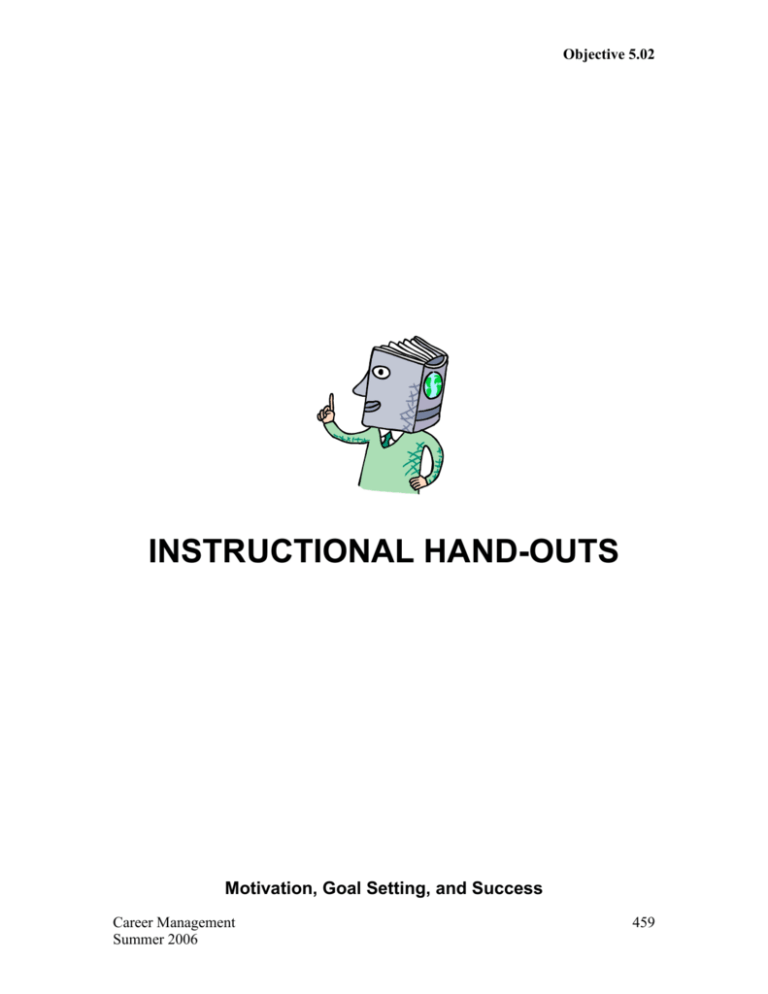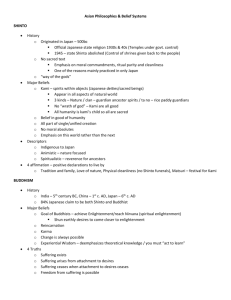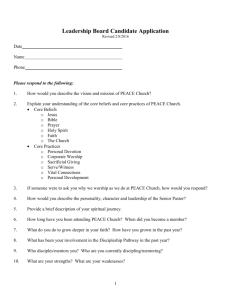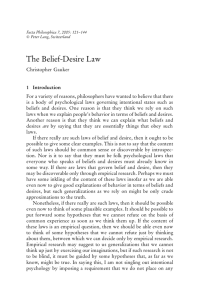Objective 5.02 INSTRUCTIONAL HAND
advertisement

Objective 5.02 INSTRUCTIONAL HAND-OUTS Motivation, Goal Setting, and Success Career Management Summer 2006 459 Objective 5.02 Motivation is the combination of desire, values, and beliefs that drives you to take action. These three motivating factors, and/or lack of them, are at the root of why people behave the way they do. Because you ultimately control your values, beliefs, and desires, you can influence your motivations. This means, if you consider something important and assign value to it, you are more likely to do the work it takes to attain the goal. When motivation originates from an internal source and is combined with a realistic goal and circumstance, the odds of a good outcome are greatly increased. In order to get motivated and stay motivated, try the following: 1) identify your values, beliefs, and desires, 2) recognize your strengths and weaknesses and use this information to establish realistic goals, 3) understand the role of personal circumstance, and 4) realize that success is the merger of all three factors. Values, Beliefs, and Desires To understand what motivates you, you’ll need to understand what is important to you. If you have never thought about this question, do it now. Consider issues such as family, relationships, learning/school, grades, work, aspirations, achievement, status, money, travel, social causes, social life, following a dream, etc. People’s goals and desires grow from their values and beliefs. Once you have made your personal list, begin to think about how the items relate to one another. Are some issues more important to you than others? Are some more important in short-term while others are more important in the long-term? Are they linked in some critical way? These issues and relationships are always alive inside us. By becoming consciously aware of them, you can begin to modify, control and understand them. Judging the quality and depth of your motivation is important, because it is directly related to your commitment. Often students find that they “want” a good academic outcome, but they can’t seem to make it happen. Sometimes, this gap occurs when there is a clash between what they are striving for (a good academic outcome/degree) and what they would rather be doing (following a dream of singing in a country-western band). It’s OK for values, beliefs, and desires to be in conflict, but it is important to recognize when they are and act appropriately on this information. In the example above, this student needs to both rethink and internalize the relationship of school and dream or she needs to change her circumstances. But without such a clarification her motivation will continue to lag and her performance will be less than it could be. Strengths, Weaknesses and Goal Setting One of the keys to college success is having a realistic view of your strengths and weaknesses. Do an informal assessment of your abilities. Reflect on what you have learned about yourself in the past from classroom experiences, conversations with teachers and advisors, standardized tests, projects and activities, and outside activities. Consider specifically your reading, writing, oral communication, math, computer, musical, artistic, physical, interpersonal, and analytic skills. An accurate and honest assessment of your abilities is essential. It prevents you from under-estimating or overestimating your skills and directs you toward attainable and appropriate goals. Having an accurate direction is important in maintaining motivation. Career Management Summer 2006 460 Objective 5.02 Knowing what you value and desire, along with an assessment of your strengths and weaknesses, makes it possible to establish personal goals. Most people already have a mix of short-term and long-term goals of some type in mind for themselves. Students often are aiming towards a particular test, project, class, grade point, degree, graduate program, professional school, or career. These are often complemented by other goals such as living a healthy lifestyle, maintaining personal integrity, volunteering, working, nurturing relationships, or growing as a person. It is not unusual for short-term goals to support long-term goals. For example, a student’s long-term goal to teach elementary school might be supported by a series of short-term goals related to class attendance, study habits, project preparation, test performance and commitment to outside activities. All goals, whether short-term or long-term, should incorporate these common attributes: Be realistic. Goals should be based on your abilities and circumstances. Be possible. Don’t establish constraints that make the realistic, unrealistic. Be flexible. Anticipate bumps in the road and expect to work around them. Be measurable. Have a target in mind so you know when you have reached your goal. Be under your control. Set your own goals based on your values, interests, and desires. Target things where you can control the outcome. Write down your goals and post them somewhere you can review them regularly. This will serve as a reminder of what you’re working toward and help to keep you motivated and on track. When your goals slip from sight and lose importance, motivation and success deteriorate as well. Personal Circumstance Once you have set goals that match your beliefs, values and desires, you should be in position to act on them successfully. However, your motivation can be undermined if you fail to consider your circumstances or if your circumstances change, but your goals don’t. A goal may match your values (“I want to earn a degree in nursing”) and may be realistically set (“I want to do it in 4 years) when you begin your academic journey, but may need modification and readjustment as time passes. If you earned grades lower than you expected to, you may need to lighten your course load or adjust your work and/or leisure hours. A loss of interest might mean you need to investigate other majors. Changes in relationships or family make-up can also introduce new constraints on your plan. Unfortunately, when circumstances change, students are often unwilling to make related adjustments in their self-expectations. In these cases, students rarely perform up to their expectations, become frustrated, and lose motivation. However, motivation and performance can be maintained when personal circumstance is taken into account. Students who are willing to redefine their goals to account for their changed circumstances can remain motivated and on the path to success. Motivation + Goals + Circumstance = Success Career Management Summer 2006 461 Objective 5.02 Motivation, goals, and circumstance are all related to success. You can increase the odds of your success by first, defining what is important to you, establishing goals based on these values, desires, and beliefs, and finally, tailoring your achievement expectations to match your circumstances. If you fail in any of these steps, you will undercut your motivation, fail to work up to your abilities, and diminish your chances of success. Watch out for these two common pitfalls: If you’re not honest with yourself about what is important to you and how these factors relate to each other – you can be in a position where you are acting on weaker motivations, but allowing your stronger motivations to interrupt your progress. For example, a student might be in school and performing poorly because he/she really wants to be establishing his/her own web-based business. In this case he/she either needs to commit to a reprioritization of values (school is more important than the dream) or adjust his/her goals to better match his/her desires and say “I’ll follow my dream first and then go to school.” Watch out for a mismatch of values/beliefs/desires and goals. Be realistic in setting your goals and always consider your circumstances. When goals aren’t realistic or when circumstances conspire against you, it is important to adjust. A student who comes to college with the goal of expecting to earn a nursing degree in 4 years, but finds the work more difficult than he/she anticipated may need to adjust his time frame in order to achieve his/her goal. Likewise, if this same student found that he/she needed to work to support his/her college costs or take on greater family responsibilities, it might be similarly necessary for him/her to adjust his/her goals as well. When your goals are realistic and match your desires, you will be motivated. When you’re motivated and work hard towards your goals, you will succeed. When you succeed, your motivation will grow, you will set new goals, and continue to achieve. Know yourself, know your circumstances, set realistic goals, and start to succeed now! Career Management Summer 2006 462







